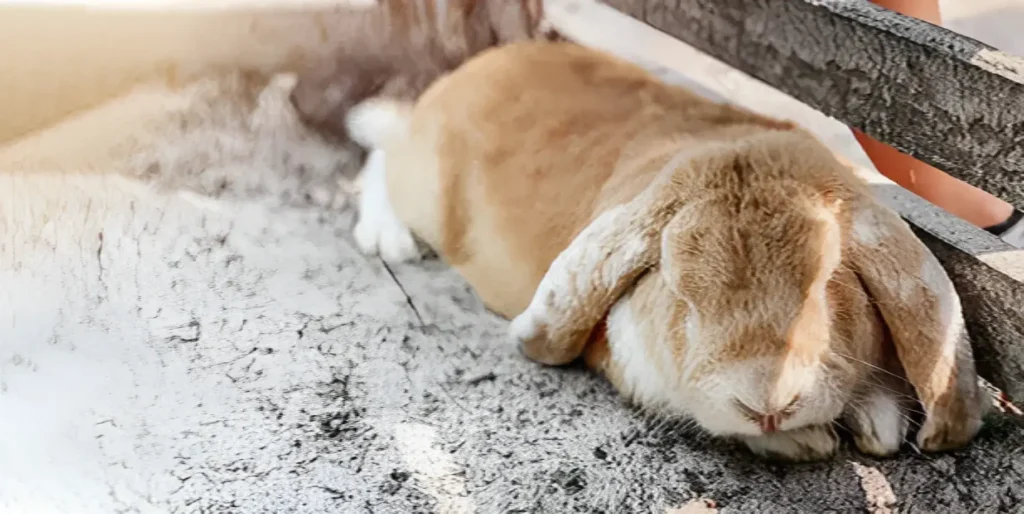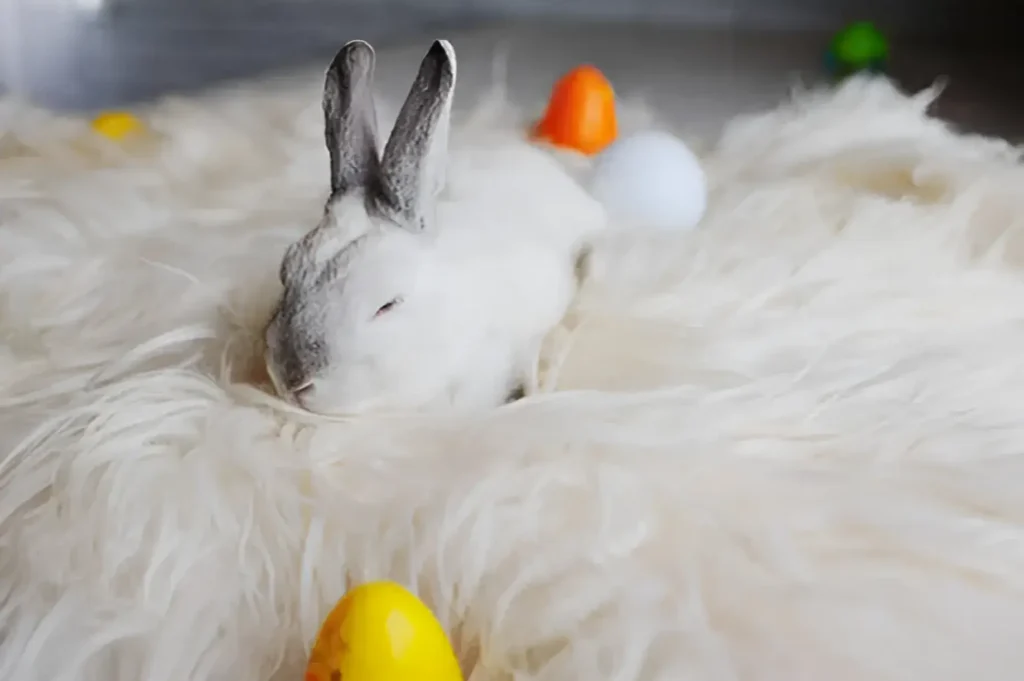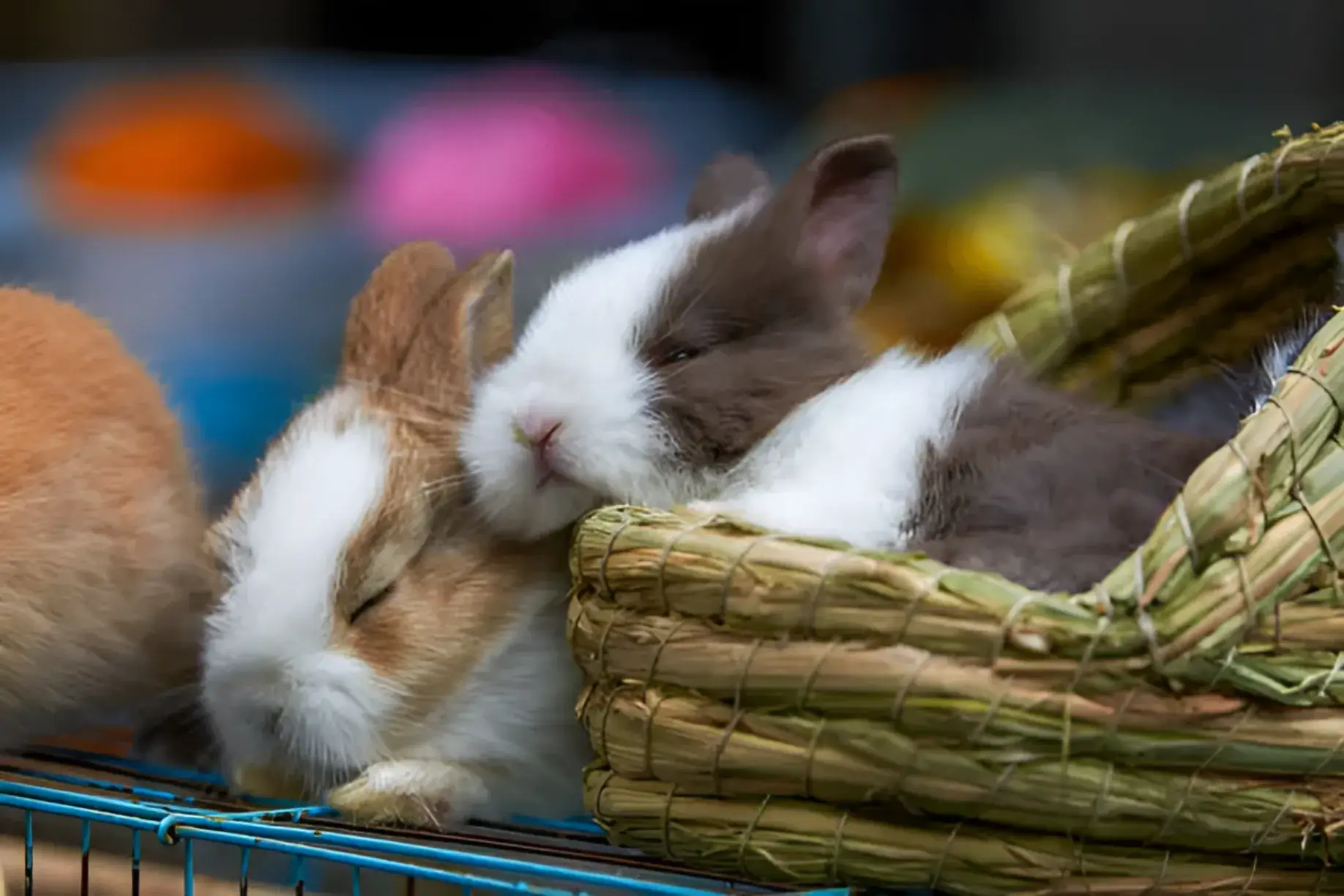Rabbits have a unique sleep schedule! They’re crepuscular, meaning they thrive during the twilight hours of dawn and dusk. Unlike humans, they don’t sleep in one long stretch but take frequent naps throughout both day and night.
Understanding Your Rabbit’s Sleep Cycle
Bunnies appear to have boundless energy, but they absolutely need rest. Understanding their unique sleep patterns helps you provide optimal comfort and spot any potential signs of sleep issues.
Why Don’t Rabbits Sleep Like Us?
Rabbits, as prey animals, have developed sleep habits that maximize alertness. Survival in the wild means staying vigilant to danger, so they often sleep in short bursts or even doze with eyes open, ready to react instantly.
Typical Rabbit Sleep Patterns
Polyphasic Sleep: Rabbits sleep in multiple short sessions throughout a 24-hour period, rather than one extended block.
Crepuscular Activity: Bunnies are most active during dawn and dusk, with periods of napping in between.
Average Sleep: Rabbits generally sleep around 8-12 hours per day.
Common Rabbit Sleep Positions
- The Loaf: Tucked up with paws hidden, this is a classic rabbit resting position.
- The Flop: Completely relaxed and stretched out on their side – a sign of deep trust and comfort.
- The Sprawl: Belly down with back legs extended, indicating relaxation.
Factors Affecting Rabbit Sleep

- Age: Young bunnies and senior rabbits may sleep more than adult rabbits.
- Environment: A quiet, dark, and safe space promotes better sleep for your bunny.
- Stress: Disruptions, illness, or anxiety can lead to sleep problems.
- Health: Underlying health conditions can impact sleep patterns.
Creating a Sleep Sanctuary for Your Rabbit
Dedicated Retreat: Offer your rabbit a designated haven, like a hutch or enclosure, where they feel secure and can fully relax.
Comfy Nest: Provide soft bedding materials, such as hay or fleece, to encourage your bunny to snuggle in and rest comfortably.
Minimize Distractions: Keep noise and bright lights to a minimum during your rabbit’s typical sleep periods to avoid disruptions.
Predictable Routine: Maintaining consistent feeding and playtimes helps your rabbit feel secure and supports healthy sleep patterns.
Signs Your Bunny Might Have Sleep Problems
- Changes in activity level: Excessive lethargy or restlessness.
- Unusual sleep positions: Consistently sleeping in uncomfortable or strained positions.
- Behavioral changes: Irritability, aggression, or changes in appetite.
Myths and Misconceptions About Rabbit Sleep
Myth: Rabbits only sleep during the day.
- Fact: Rabbits are crepuscular, meaning they are most active at dawn and dusk, but they do nap throughout the day and night.
Myth: A rabbit sleeping on its side is sick.
- Fact: The “flop” position, where a rabbit sleeps completely sprawled on its side, is actually a sign of deep relaxation and trust.
The Importance of Sleep for Rabbits

Mind, Body, Spirit: Adequate sleep is crucial for rabbits, just like us. It benefits them in many ways:
Brain Power: Sleep supports memory, learning, and overall cognitive function.
Strong Immune System: Rest allows the body to release hormones essential for fighting illness.
Happy Bunnies: Proper sleep promotes good moods and reduces stress. Sleep deprivation can lead to irritability and aggression.
Rabbit Sleep Disorders (Consult a veterinarian for diagnosis)
Sleep Troubles: While less common, rabbits can experience sleep disorders. These might include:
Sleep apnea: This condition causes brief pauses in breathing during sleep.
Insomnia: Stress, pain, or disruptions can make it difficult for rabbits to fall or stay asleep.
Bonus: Rabbit Dreams
While research on rabbit dreaming is limited, some experts believe they might experience REM sleep based on observations of twitches and murmurs during sleep. It’s a fascinating area of ongoing research, but the adorable sight of a dreaming bunny adds another layer to their complex sleep behavior.
Conclusion
Being a good rabbit owner means understanding their sleep needs. Provide a cozy space, respect their active times, and watch for changes that might need a vet’s attention. This ensures your bunny gets the rest they need to be happy and healthy!
The photo featured below the post headline is Credit: Qin Ningzhen/istockphoto
I hope you find this post helpful and informative. If Yes’ feel free to share it with your friends!
Frequently Asked Question
My bunny sleeps with its eyes open. Is that normal?
Yes, it’s common for rabbits to sleep with their eyes partially or fully open as a survival mechanism.
Does my bunny need a dark environment to sleep?
While not essential, minimizing bright light, especially at night, can help promote better sleep.
My bunny is most active at night. Can I change their schedule?
Rabbits are naturally crepuscular, and it can be difficult to change their instincts. Focus on providing engaging activities during their peak energy times.
How long do bunnies sleep at night?
Rabbits don’t sleep for extended periods at night like humans. They take frequent naps throughout the night and day, with their most active periods being around dawn and dusk.
Do bunnies sleep in the dark?
Rabbits are flexible sleepers! They can rest comfortably in darkness, but it’s not a requirement. They often doze in dimly lit areas or even with some background light.
How much of the day do baby bunnies spend sleeping?
Baby bunnies (kits) are champion sleepers! They spend much of their time napping, often in longer stretches and more frequently than adult rabbits. This rest is crucial to support their rapid growth.
What’s a typical sleep schedule for wild rabbits?
To stay safe from predators, wild rabbits are most active at dawn and dusk. They generally rest during the hottest part of the day and the darkest hours of the night, taking short naps between foraging for food and socializing.
My rabbit sleeps in strange positions. Is that normal?
Rabbits have a variety of comfy sleep positions that might look odd to us. “The Flop” (on their side) shows deep relaxation, while “The Sprawl” (belly down, legs out) signals comfort. If you see consistently tense or rigid positions, it’s worth keeping an eye on.
Should I wake up a sleeping rabbit?
It’s best to let sleeping bunnies lie! If you must wake them, do so gently by speaking softly or offering a treat rather than startling them with touch.
My rabbit seems extra sleepy lately. Should I worry?
Changes in sleep patterns can sometimes signal health problems or stress in rabbits. If you notice big changes in how much your rabbit sleeps, it’s wise to consult your veterinarian.
How do I know if my rabbit is getting enough rest?
A well-rested rabbit will be alert and active during their peak energy times and will maintain good grooming habits. If your bunny seems unusually sluggish, irritable or has changes in appetite, they might need more (or better quality) sleep.

